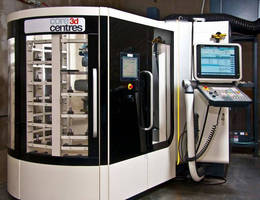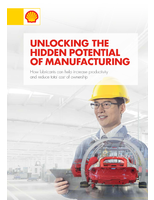Ultrasonic Machining Equipment
Core3D Provides Dental Labs with New Materials and New Products through Advanced Manufacturing Techniques

International firm uses robotic ultrasonics and conventional machine tools to supply product, usually with 24-hour turnaround; achieving near 24-7 unattended operation with over 15 percent reduction in scrap material on very expensive substrates
OpenHealth, one of the world's leading providers of business and technical solutions to the dental healthcare industries, was formed by the owners of five major international dental lab groups - Aurum, Cordent, DTS, Race and ZMC - who combined to harness the strategic synergies of their respective lab and milling center services. The milling and technology business, under the brand name of Core3D Centres and operating six facilities, brings the OpenHealth group's expertise and comprehensive service package to labs, dentists and educational institutions in 15 countries on three continents.
We interviewed Tim McKimson, Core3D's Worldwide Director of Engineering, at OpenHealth's Las Vegas-based Core3D facility, located near the prestigious Las Vegas Institute for Advanced Dental Studies (LVI), where restorative and cosmetic dental techniques are taught to practicing dentists and lab technicians, Here, Core3D provides a full range of CAD/CAM/CNC machining and finishing services to LVI and dental labs across the United States. Led by technical operators Mark Ferguson, Danny Palomares and Drew Hrubes, the Core3D team prepares CAD files developed from data typically gathered with an iTero oral scanning wand or from CAD files from scans of conventional dental impressions from the patient's mouth, which are then digitally captured in a dental scanner from companies such as 3shape. CADENT and other software are typically used to image the impression and begin the process of creating the crown, bridge, abutment, coping, implant or even full denture restoration, as required by the individual lab. 3D CADENT files are G-coded at a remote location of the parent company for transfer to the CNC machine tools at the various Core3D facilities worldwide.
The next step is translation of the digital impression to a RenShape® mold, using conventional machine tools. In most cases, the required structures are designed simultaneously, then the mold with coping is introduced to the DMG Sauer ultrasonic dental machine for preparation of the final structures. This is where the most advanced substrates are processed, ranging from conventional, yet difficult to machine metals such as titanium and cobalt chrome, to the newest advanced materials, including glass ceramics, lithium disilicate and zirconia. These substrates are quite expensive, therefore extreme care is taken in their handling and processing to reduce scrap and conserve operating costs.
As McKimson explained, the decision to cut with ultrasonic technology was relatively easy, given the inherent wear conditions and high cost of conventional tooling. In the ultrasonic process, a combination of electrolysis and fluid lubrication act in concert to create an ionic attraction of particles, removing material in a highly predictable and accurate manner, without the mechanical stress implicit in conventional machining techniques. As a result, the surface of even the hardest materials can be machined with the necessary tactile smoothness required for dental implants.
The DMG Sauer ultrasonic machines located at this Las Vegas facility, fully operated by Siemens Sinumerik 840D sl CNC technology, are loaded with blanks of material into a 66-position feeder station, then delivered into the cutting theater by a Motoman robotic arm with Schunk pressure grippers. The Sinumerik 840D sl recognizes the code on each workpiece pallet and each job is identified by the patient's name to minimize the risk of error in work product delivery. As McKimson further notes, in detailing the accuracy of the ultrasonic machining technique, each tool used is obtained from the 25-position tool changer and its position is monitored by an integral Renishaw probe. The technicians often load three sets of the tools needed for the 66-piece runs, ensuring virtually 24/7 unattended operation of the machines. Through the capability of the Siemens CNC, a remote alarm can be sent when tool breakage or other off-normal condition occurs during production.
The extremely hard materials being machined are produced with accuracies in the 2-4 micron range, owing to the combination of ultrasonic technology and the high precision of the Sinumerik CNC, according to McKimson, who notes the reliability of this accuracy has been a significant advantage in reducing scrap at Core3D.
In another area of the facility, conventional mills are used to make polyurethane models and Wieland Zeno 4820 and 4030 mini-milling machines are also utilized for the production of various crowns, wax/resin forms and models, veneers, inlays and implant abutments.
As evidence of the decidedly international nature of this emerging dental giant, all the zirconia and lithium disilicate materials are provided in the IPS e.max System from Ivoclar Vivadent, a company based in Liechtenstein. The company has branches in the United States and Canada, which supply the Core3D Centres in those countries. The templates and cutting tools are closely controlled and validated by the manufacturer to ensure that the preparation of these materials in dental applications is properly executed.
In commenting on the use of the DMG Sauer ultrasonic machines, McKimson notes that it was the machine builder who recommended the Siemens control. "They knew we were dental technicians and engineers, not machinists, by nature. The Siemens control has been extremely easy-to-use and our training time from the builder was minimal. Troubleshooting is mostly done by our operators, with only occasional assistance from Siemens." Danny Palomares, one of the technical operators, agrees. "My training is in the dental lab world, not on machine tools. It was a great relief to have such a sophisticated control operate with relatively simple language commands and cycle adjustments."
Palomares is also responsible for the translation of the lab's incoming data files, so he is involved from start-to-finish with most of the projects done at this Core3D facility. In a single day, for example, he might use Delcam DentCAD, then hyperDENT CAM software, all translating the cutting paths from the dentist's impression to the Siemens CNC on the DMG ultrasonic machines in this facility. As McKimson adds, "The sub-routines on the Sinumerik CNC make our job much easier to accomplish and faster to complete. Plus, when you add the upside of at least 15 percent reduction in the scrap that we've realized with the ultrasonics, it's a real win-win situation for us."
While there are substantial differences between the European and American dental labs in terms of the materials and assembly techniques used, and despite the fact that literally all projects are highly customized based on the individual needs of the patients and the preferences of the labs and those of the dentists performing the procedures, in the end, the typical project is being turned in 24 hours or less.
For Core 3d Centres, utilizing the best-in-class equipment is critical. In complement the quality machines here, a key part of the overall efficiency protocol in the Core3D network of companies, McKimson points out, is the "know-how" provided through their CAM-DO committee. This global technical committee conducts regular online meetings to discuss what's working and what's not in their various worldwide operations and then optimizes and standardizes the processes. He recalls one unanimous vote of approval was voiced on the performance of the DMG Sauer ultrasonic machines with Siemens controls. Core3D currently has nine such machines in their network, all used to process the most advanced materials.
For more information on this story, please contact:
Drive Technologies - Motion Control (Machine Tool)
390 Kent Avenue
Elk Grove Village, IL 60007
Phone: 847-640-1595
Fax: 847-437-0784
Web: http://www.usa.siemens.com/cnc
Email: SiemensMTBUMarCom.sea@siemens.com
Attention: John Meyer, Manager, Marketing Communications
or
Core3D Centres
5955-2 Wigwam Avenue
Las Vegas, NV 89139
Toll-Free: 1-888-750-9204
Phone: 702-750-9204
www.core3dcenters.com
tmckimson@core3dcenters.com
Tim McKimson, Engineering Technology Director
® RenShape is a registered trademark of Huntsman Corporation.




